
AXA
How one visionary company is transforming its people with the power of a skills development platform.
Background
Companies are facing a challenge: to empower their workforce to develop skills needed in the future, to enable them to find more opportunities within their organization – future proofing skills gaps and matches with a forward-looking plan. This isn’t a once-and-done kind of process, especially with the nature of rapid changes in the world; upskilling will need to be done consistently to stay ahead of the curve.
This is the issue AXA Switzerland was looking to face head-on.
0
Countries Worldwide
0
Employees
Future facing
Operating in 57 countries globally with over 160,000 employees, AXA is a global giant in the financial services and investment world, continuously striving to make customers’ lives better and safer.
They support visionary start-ups shaping the future of healthcare technology, research to help people live longer, healthier lives, and even driverless car projects to revolutionise road safety.
They challenge the way things are, push boundaries, and this reflects the reason for this approach to business development opportunities and solutions to futureproof the business and employees.
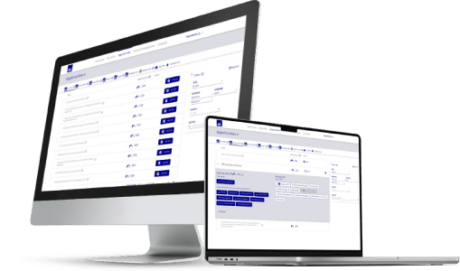
Understanding the challenge
Identifying the need to empower employees to take development into their own hands, AXA Switzerland needed to understand not only the skills they already had within the business, but also what will be needed in the future as the business changes and grows.
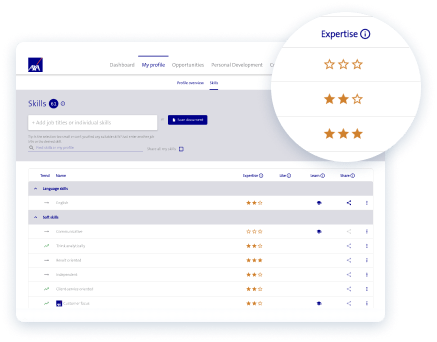
While many jobs evolve or require different skills, new jobs to meet the changing landscape are also being created that must be filled in the future. There is still the plan to hire new people, however AXA Switzerland is facing this people development challenge by looking to match and reskill/upskill their current workforce in line with their identified future opportunities. Plus, current openings give opportunities for employees to progress with relevant matched skills or training.
The focus is understanding current skills, and empowering people within the business to develop and secure the skills that will be important in the future. Managers and HR needed to understand:
Managers and HR needed to understand:
- How well their teams are positioned in terms of skills.
- Which skills will be important in the future.
- Which internal talents have the best potential to develop into a new role.
- How those affected can be better supported in their reorientation.
For employees, this means understanding:
- Which future-oriented roles in the company match their personal skills profile.
- Which skills are critical for success in the respective role.
- How skills gaps can be closed quickly and effectively through development opportunities.
- How to improve their own employability through additional learning.
- How they can get in touch with experts in the organisation to learn from internal experts and peers.
All of these factors would combine to create a data-driven backbone to an internally mobile workforce, whose skills are known, and whose employees have transparency of skills gaps and opportunities to develop, move and grow.
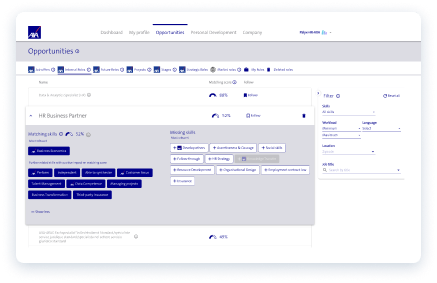
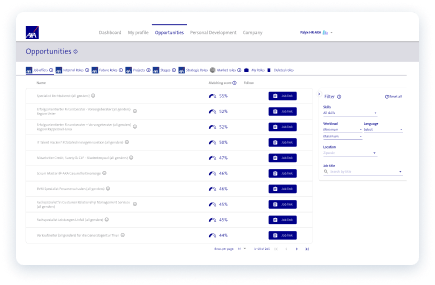
Matchmaking solution
AXA began working with People-Analytix (now a Learning Pool company) around five years ago, looking into the possibility of solutions to their future-facing objectives.
People-Analytix helped the business identify the current and future skills needed. Its Skills Platform offers a unique database, artificial intelligence and analytical forecasting methods to clarify, interpret and establish the development of in-demand skills for the internal and external labour market.
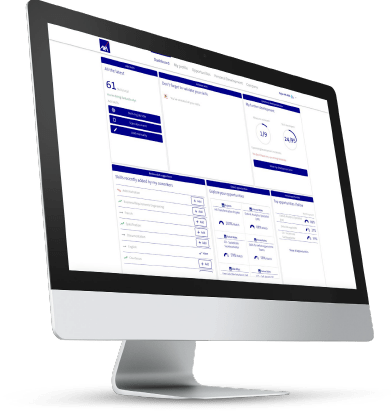
Utilising these tools, AXA’s Skills Platform was created – a system for employees to create skills profiles and shape their development options, based on gaps or opportunities for progression. They’re then able to match new or existing vacancies by examining desired proficiency.
Starting small with a sample group of around 50 employees, profiles for roles and desired skills were created within the business, and employees completed their own profiles. This has now grown to around 3,500 employee profiles completed (out of 4,500), and role profiles for current and future positions aligned and created.
Impacting the future for all
The Skills Platform analysis capabilities have provided AXA the opportunity to look ahead, examining market and industry trends to shape and outline the skills and roles that may be required in the future for the business.
As an example, new role skills profiles have been created for future health underwriter roles, where the skills focus has been identified as shifting towards a need for more communication skills (including customer and language skills), negotiation competencies and international focus.
This future-facing ability has enabled AXA to begin to shape the developmental needs of employees to meet these future skills needs – ahead of the time of need.
“The tool helps us, supporting employees in their personal development and supports our transformation with focus on future needed skills in a dried-up job market.”
Mark NäfProduct Owner Data Driven HR
With the Skills Platform, fully aligned to the AXA learning and development platform, employees can access key learning opportunities directly as identified, and highlight opportunities for learning as new roles are posted. They’re also notified as opportunities arise that match their skills or desired path of progression.
In addition, HR and business leaders are able to:
- Plan for future skills requirements.
- Create a skills inventory within current teams and departments.
- Assess skills by manager group.
- Determine skill readiness of individuals, teams, and the organisation as a whole.
- Source active internal candidates, increasing internal role mobility.
Results realized
So far, AXA has seen a dramatic increase in employees focus on personal skills development. This has culminated in:
0
employees completed their skills profile
0
future facing role skills profiles created
0
monthly users
0 %
Overall satisfaction of users
The success brought by the Skills Platform means AXA can begin rolling the tool out to broader teams and departments, enabling:
- Further strategic role profiling for future business needs.
- Higher rates of internal mobility – a skill-based internal marketplace for new job postings and projects.
- Greater employee growth and development through a digital and scalable career guidance for all employees.
- Less staff attrition, and higher employee engagement.
- Better workforce planning thanks to transparency on existing and missing skills.

Through working with People-Analytix and now Learning Pool, the AXA Skills Platform is paving the way for employee transparency, enabling self-perpetuation of development and visibility in progression and growth opportunities. In addition, the business will benefit from greater internal employee mobility as skills are matched and opportunities to develop are taken to meet future needs.
Got a learning problem to solve?
Get in touch to discover how we can help


